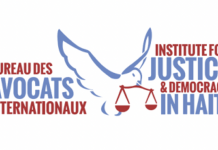Open Letter to US Officials by various authors (published by Haiti Liberte)
Oct. 22, 2012, Washington, D.C. – On the second anniversary of the
outbreak of the cholera epidemic in Haiti, human rights groups, faith-based
organizations, policy institutes, and humanitarian organizations renew their
call for the United Nations and U.S. government to help Haiti install the clean
water and sanitation infrastructure necessary to control the ongoing epidemic.
outbreak of the cholera epidemic in Haiti, human rights groups, faith-based
organizations, policy institutes, and humanitarian organizations renew their
call for the United Nations and U.S. government to help Haiti install the clean
water and sanitation infrastructure necessary to control the ongoing epidemic.
The
cholera epidemic in Haiti has received less U.S. attention during the
presidential campaign season, but it remains a critical problem for this
Caribbean neighbor that is not being adequately addressed and is undermining
broader aid efforts. Last month, 260 new
cholera cases were reported daily, and 2-3 children died a day. Since the epidemic broke out in October 2010,
7,564 Haitians have reportedly died from cholera and some 600,000 persons (6%
of the Haitian population) have been infected. The number is undoubtedly much
higher, as cases in more remote areas are often unreported. As the World Health
Organization has stated, those without access to safe drinking water, proper
sanitation, and hygiene constitute the majority of cholera cases.
cholera epidemic in Haiti has received less U.S. attention during the
presidential campaign season, but it remains a critical problem for this
Caribbean neighbor that is not being adequately addressed and is undermining
broader aid efforts. Last month, 260 new
cholera cases were reported daily, and 2-3 children died a day. Since the epidemic broke out in October 2010,
7,564 Haitians have reportedly died from cholera and some 600,000 persons (6%
of the Haitian population) have been infected. The number is undoubtedly much
higher, as cases in more remote areas are often unreported. As the World Health
Organization has stated, those without access to safe drinking water, proper
sanitation, and hygiene constitute the majority of cholera cases.
Two
years after the epidemic started, not enough action has been taken to assist
the Government of Haiti in acquiring essential water and sanitation
infrastructure. A regional coalition
that includes the U.S. Centers for Disease Control and Prevention, and the
World Health Organization is developing a plan with the Government of Haiti to
build water and sanitation systems that will cost $2.2 billion. Despite this
encouraging progress, the plan still needs to be finalized and funded before
implementation can begin.
years after the epidemic started, not enough action has been taken to assist
the Government of Haiti in acquiring essential water and sanitation
infrastructure. A regional coalition
that includes the U.S. Centers for Disease Control and Prevention, and the
World Health Organization is developing a plan with the Government of Haiti to
build water and sanitation systems that will cost $2.2 billion. Despite this
encouraging progress, the plan still needs to be finalized and funded before
implementation can begin.
The
U.N. especially has a legal and moral responsibility to play a leadership role
in helping end the epidemic. Independent scientific studies have established
that cholera was brought to Haiti by troops from the UN Stabilization Mission
in Haiti (MINUSTAH) and that the waste disposal practices at the UN base
allowed the bacteria to contaminate Haiti’s largest river system. The undersigned groups call on the U.N. to
commit long-term resources to work with the Government of Haiti to build water
and sanitation systems that are critical to halting the continued spread of the
disease.
U.N. especially has a legal and moral responsibility to play a leadership role
in helping end the epidemic. Independent scientific studies have established
that cholera was brought to Haiti by troops from the UN Stabilization Mission
in Haiti (MINUSTAH) and that the waste disposal practices at the UN base
allowed the bacteria to contaminate Haiti’s largest river system. The undersigned groups call on the U.N. to
commit long-term resources to work with the Government of Haiti to build water
and sanitation systems that are critical to halting the continued spread of the
disease.
This
July, 104 members of Congress sent a letter to Susan Rice, U.S. Ambassador to
the UN, requesting that she urge the world body to act decisively to address
Haiti’s cholera crisis. Congressional members Chris Smith and Albio Sires made
a similar plea to Secretary of State Hillary Clinton. The undersigned groups urge Ambassador Rice
and Secretary Clinton to fulfill these important appeals and to call on the UN
to help Haiti acquire the necessary funding to develop the water and sanitation
infrastructure needed to stop the epidemic.
July, 104 members of Congress sent a letter to Susan Rice, U.S. Ambassador to
the UN, requesting that she urge the world body to act decisively to address
Haiti’s cholera crisis. Congressional members Chris Smith and Albio Sires made
a similar plea to Secretary of State Hillary Clinton. The undersigned groups urge Ambassador Rice
and Secretary Clinton to fulfill these important appeals and to call on the UN
to help Haiti acquire the necessary funding to develop the water and sanitation
infrastructure needed to stop the epidemic.
Signatory Groups:
Alternative Chance
American Jewish World Service
Canada Haiti Action Network
Center for Economic and Policy
Research
Research
Center for Gender & Refugee
Studies
Studies
Environmental Justice Initiative
for Haiti
for Haiti
Grassroots International
Hastings to Haiti Partnership
Institute for Justice &
Democracy in Haiti
Democracy in Haiti
Just Foreign Policy
li, li, li! Read
Mennonite Central Committee U.S.
Washington Office
Washington Office
New Media Advocacy Project
Other Worlds
The Haiti Support Group
TransAfrica Forum





